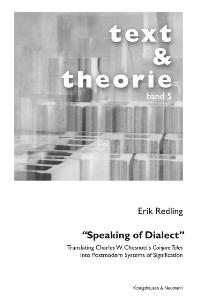Beschreibung
The self-contained concepts of postmodern theories, which are widely accepted today as interpretive tools in literary criticism, produce distorted readings when schematically applied to dialect texts. In order to avoid such predetermined results, Redling’s study focuses on specific characteristics of dialect writing as exemplified in selected stories by the African American writer Charles W. Chesnutt and investigates their potential translation into the terms of postmodern theory. Using George Steiner’s notion of “understanding as translation,” it confronts textual passages with theoretical terms, which in turn are tested on Chesnutt’s dialect stories. The two-pronged approach to “understanding” draws on the linguistic distinction between denotation and connotation: in the denotative process, a critic translates phenomena extrapolated from Chesnutt’s dialect texts into postmodern “systems of signification.” This process highlights both similarities and points of deviation between the dialect text and the six selected theories (Derrida, Lacan, Foucault, Bakhtin, Iser, and Jameson). A subsequent connotative translation process shows how denotatively restricted postmodern concepts can still advance a theory’s explanatory power by enhancing the imaginative experience of a text. However, this second approach also exposes serious limitations in the use of postmodern theories. Redling concludes that the analysis of literary texts must proceed beyond postmodernism and develop a more broadlybased aesthetic to meet the complexities of dialect texts. Der Autor Erik Redling, wissenschaftlicher Assistent am Lehrstuhl für Amerikanistik an der Universität Augsburg, studierte Amerikanistik und Geschichte an der Universität Augsburg und an der North Carolina State University und promovierte 2003 im Fach Amerikanistik.

